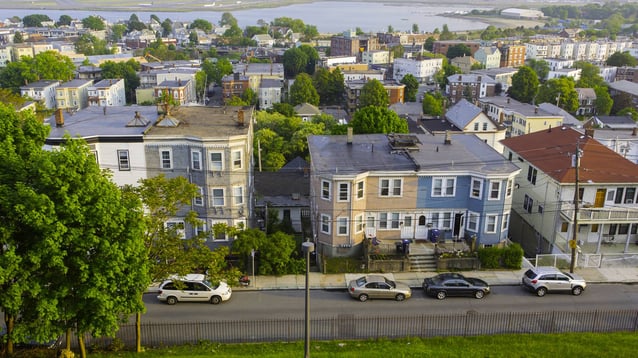In Massachusetts, Rhode Island, and most other states, the building sector is second only to transportation in terms of greenhouse gas (GHG) emissions. For states that have already passed laws committing to serious GHG reductions, there is no way to avoid making a timely transition to clean heat (i.e. switching from methane, heating oil, and propane to electrification).
But what’s a decarbonizer to do, exactly? Let's assess some of the options that are on the table for state governments. Spoiler alert: These are all excellent policies, but each one is insufficient. None of them are capable on their own of reducing building sector emissions 50% by 2030 or to net zero by 2050. But together they can.
All-Electric New Construction & Better Building Codes
Old buildings are replaced with new ones at a pace of 1-2% per year, enough to matter greatly by 2050. A home, business, or school built today with fossil fuel heat does not make sense given that we have to be net zero in just 27 years. There’s an equity component here as well. If you insist on building with fossil fuel heat, then you’re putting more pressure on someone else – a person or institution – to reduce their emissions in another building, or even somewhere within the transportation or electricity sectors. If you are able to construct something new today, you have the option of occupying and retrofitting something that is already standing. And that is why it’s fair to impose the all-electric requirement on new construction.
 Social equity, however, all calls upon us to treat certain types of new construction such as affordable housing and public schools differently. We need to build those new structures to meet important social needs. Public funds need to be applied to those projects to make the numbers work.
Social equity, however, all calls upon us to treat certain types of new construction such as affordable housing and public schools differently. We need to build those new structures to meet important social needs. Public funds need to be applied to those projects to make the numbers work.
A step before full electrification is to require states to adopt the latest International Energy Conservation Codes (IECC), which lay out minimum energy efficiency requirements for new and renovated buildings and can lead to cost savings for building owners and occupants, as well as reductions in GHG emissions.
In Rhode Island, the law requires the adoption of the latest IECC for residential buildings. Despite this statutory requirement, Rhode Island has only incorporated the 2018 code, when the latest iteration is 2021, and the 2024 IECC is expected to be released this Fall. As a result, we are advocating for:
- H6101/S0855, State Building Code, sponsored by Representative Edwards and Senator Gu, which requires the RI building code commission to adopt the latest versions of the International Energy Conservation Code (IECC), including electric readiness provisions in the 2024 IECC. You can learn more by reading this fact sheet.
- H5600, All Electric Buildings Act, sponsored by Representative Cortvriend, which requires new construction to be all-electric starting in 2025. Exceptions would be granted to restaurants, hospitals, medical facilities, or biolabs.
Before you dismiss these bills as unrealistic, note that New York State just passed a law prohibiting gas hookups in new construction, beginning in 2026 for buildings under seven stories; 2029 for taller ones.
Clearly, building codes affecting new construction are an essential piece of the puzzle, but their one flaw is that they work too slowly. If we say that only new construction has to be all-electric, it won’t be until the latter part of this century that we reach zero combustion. That’s too late. We need retrofit policies, and there is no time to waste.
Building Performance Standards (BPS)
 This policy tackles emissions from existing buildings, which is crucial to achieving our states' goals of net-zero by 2050, as around 70% of our building stock then is already standing today. A BPS sets a performance threshold that building owners must meet at a specified time or when a triggering event occurs, such as a major renovation. Boston has a BPS already in place and so do a handful of other jurisdictions around the country. Usually, a BPS starts with 3 years of mandated reporting on energy and emissions from large buildings, often 20,000 square feet (SF) and above. This reporting provides the state with data that can guide how much and how fast buildings will be required to reduce their emissions. In Boston’s case, owners of large buildings are now required to reduce emissions on an annual basis until they reach net zero by 2050.
This policy tackles emissions from existing buildings, which is crucial to achieving our states' goals of net-zero by 2050, as around 70% of our building stock then is already standing today. A BPS sets a performance threshold that building owners must meet at a specified time or when a triggering event occurs, such as a major renovation. Boston has a BPS already in place and so do a handful of other jurisdictions around the country. Usually, a BPS starts with 3 years of mandated reporting on energy and emissions from large buildings, often 20,000 square feet (SF) and above. This reporting provides the state with data that can guide how much and how fast buildings will be required to reduce their emissions. In Boston’s case, owners of large buildings are now required to reduce emissions on an annual basis until they reach net zero by 2050.
This is a great, necessary decarbonization policy, but it needs to be done statewide. Massachusetts' 2022 climate bill started the data collection process with a good provision (sponsored by Senator Becca Rausch) requiring utilities to report energy usage of large buildings to the Mass. Department of Energy Resources. But it’s just a start. So we’re supporting two bills on the subject:
- H.3213/S.2178 An Act relative to better buildings, sponsored by Rep. David Rogers and Senator Rausch. It follows up the 2022 legislation by creating a building performance standard for large buildings over 20,000 SF run by the Department of Energy Resources (DOER). The building performance standards need to match what is required by our Global Warming Solutions Act. Funding from alternative compliance payments would go to low-income household electrification and energy efficiency projects.
- H.3192/S.2144 An Act relative to building energy and decarbonization, sponsored by Rep. Joan Meschino and Senate Jason Lewis. It creates a building performance standard run by a new division of DOER which would consult with other departments/stakeholders to create regulations for the program. The BPS would start with buildings over 20,000 SF in 2026, would expand to all building types in 2028, and all buildings in 2032. The BPS will be set up in a way that aligns with the emission reduction requirements of the Global Warming Solutions Act. Funding raised by the BPS would go to a new building retrofitting program targeting low-income and Environmental Justice households and municipally owned buildings. This bill also has many non-BPS sections worth noting.
Rhode Island doesn’t yet have a BPS policy of any kind. This is why we’re advocating for H5425/S0166, The Green Buildings Act, sponsored by Rep. Kislak and Senator Gu, which tackles emissions from large existing buildings by requiring energy reporting and building performance standards. The bill starts off by requiring large buildings (starting at 10,000 SF for state buildings and 25,000 SF for commercial and residential buildings, which reduces to 15,000 SF over time) to report their energy usage and Greenhouse Gas Emissions to a central data repository. This provides the state with data that can guide the standard to reduce the energy use of large buildings. This data also helps building owners measure their emissions, compare them with their neighbors, and implement ways to reduce their energy usage. Subsequently, the Office of Energy Resources would be required to set declining standards of emissions for large buildings. You can learn more by reading this fact sheet.
Clean Heat Standards
A Clean Heat Standard (CHS) is a performance-based obligation at the state level on companies that supply heat by methane, heating oil, or propane. Each year, they would be required to deliver a gradually increasing amount of zero-emission heat (think heat pumps or insulation) to customers, whether their own or another supplier’s. Consumers would be able to choose whether to stay with their existing heating system or upgrade on their own schedule. To comply with the new rules, an obligated company would have to offer incentives to consumers to adopt a clean heat solution.
A stringent CHS would reduce heating sector emissions on a glide path down to zero by 2050. That’s necessary and the energy efficiency programs that we now have, run by the utilities and overseen by the state, are not coming close to doing that.
 A good CHS would have an impact on all types of construction – old, new, large, small, residential, or commercial. This makes it extraordinarily effective. Over time, the heating industry will be transformed from fossil fuel-based to electrification (primarily with air-source heat pumps, geothermal, or networked geothermal). But to make it equitable from the start, at least 40% of the clean heat credits or investments made through the program should benefit low- and moderate-income households and buildings that serve that low- and moderate-income consumers (I.e., health clinics, food pantries, schools).
A good CHS would have an impact on all types of construction – old, new, large, small, residential, or commercial. This makes it extraordinarily effective. Over time, the heating industry will be transformed from fossil fuel-based to electrification (primarily with air-source heat pumps, geothermal, or networked geothermal). But to make it equitable from the start, at least 40% of the clean heat credits or investments made through the program should benefit low- and moderate-income households and buildings that serve that low- and moderate-income consumers (I.e., health clinics, food pantries, schools).
A feature of both Building Performance Standards and Clean Heat Standards is the Alternative Compliance Payment. If a building owner (in the BPS case) or a heating supplier (in the CHS case) fails to comply as directed, it can make a cash payment to a dedicated account managed by the government. The rate required for those payments should be high enough to encourage direct compliance, but it’s inevitable that funds would flow into that dedicated account. Those dollars can be used to further promote equity.
In Massachusetts, Rep. William Driscoll has filed H.3694 to establish a Clean Heat Standard, one of our major priorities this year. And in March, the Department of Environmental Protection solicited feedback from the public to inform the development of draft CHS regulations. Working with allies (Acadia Center, Conservation Law Foundation, HEET, and Pipeline Awareness Network), we submitted comments you can read here.
Are We There Yet?
Any state with goals as lofty as Massachusetts and Rhode Island should back up those goals with policies that would get the job done. In our view, the three policies taken together make a package that can equitably achieve the greenhouse gas reductions we need. They complement each other quite well. But there are ways to speed up progress with progressive funding sources. In Massachusetts, we’re supporting the Zero Carbon Renovation Fund, a requested $300 million state appropriation, and the HERO bill, which would raise the deeds excise tax and split revenue between affordable housing and climate action.
Of the three sectors – transportation, buildings, and electricity – buildings are the most difficult to decarbonize. But we must do just that, equitably, and as fast as possible.
 Social equity, however, all calls upon us to treat certain types of new construction such as affordable housing and public schools differently. We need to build those new structures to meet important social needs. Public funds need to be applied to those projects to make the numbers work.
Social equity, however, all calls upon us to treat certain types of new construction such as affordable housing and public schools differently. We need to build those new structures to meet important social needs. Public funds need to be applied to those projects to make the numbers work. This policy
This policy A good CHS would have an impact on all types of construction – old, new, large, small, residential, or commercial. This makes it extraordinarily effective. Over time, the heating industry will be transformed from fossil fuel-based to electrification (primarily with air-source heat pumps, geothermal, or networked geothermal). But to make it equitable from the start, at least 40% of the clean heat credits or investments made through the program should benefit low- and moderate-income households and buildings that serve that low- and moderate-income consumers (I.e., health clinics, food pantries, schools).
A good CHS would have an impact on all types of construction – old, new, large, small, residential, or commercial. This makes it extraordinarily effective. Over time, the heating industry will be transformed from fossil fuel-based to electrification (primarily with air-source heat pumps, geothermal, or networked geothermal). But to make it equitable from the start, at least 40% of the clean heat credits or investments made through the program should benefit low- and moderate-income households and buildings that serve that low- and moderate-income consumers (I.e., health clinics, food pantries, schools).
Comments